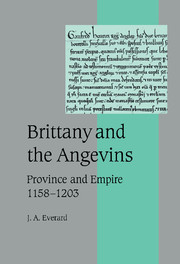Book contents
- Frontmatter
- Contents
- List of figures and maps
- Preface
- List of abbreviations
- Genealogy of the dukes of Brittany, 1066–1203
- The principal political divisions of Brittany, c. 1066
- Ducal domains, c. 1066–1186
- Introduction
- 1 Ducal Brittany, 1066–1166
- 2 Henry II and Brittany
- 3 The government of Brittany under Henry II
- 4 Duke Geoffrey and Brittany, 1166–1186
- 5 Duke Geoffrey, Henry II and the Angevin empire
- 6 The end of Angevin Brittany, 1186–1203
- Conclusion
- Appendices
- Bibliography
- Index
- Cambridge Studies in Medieval Life and Thought Fourth series
5 - Duke Geoffrey, Henry II and the Angevin empire
Published online by Cambridge University Press: 15 December 2009
- Frontmatter
- Contents
- List of figures and maps
- Preface
- List of abbreviations
- Genealogy of the dukes of Brittany, 1066–1203
- The principal political divisions of Brittany, c. 1066
- Ducal domains, c. 1066–1186
- Introduction
- 1 Ducal Brittany, 1066–1166
- 2 Henry II and Brittany
- 3 The government of Brittany under Henry II
- 4 Duke Geoffrey and Brittany, 1166–1186
- 5 Duke Geoffrey, Henry II and the Angevin empire
- 6 The end of Angevin Brittany, 1186–1203
- Conclusion
- Appendices
- Bibliography
- Index
- Cambridge Studies in Medieval Life and Thought Fourth series
Summary
The previous chapter demonstrated Duke Geoffrey's able performance as Henry II's lieutenant in Brittany from 1175 to 1181, and his competent government of the duchy from 1181 to 1186. This aspect of Geoffrey's career has been overlooked by contemporary chroniclers and modern historians alike, their only interest in Geoffrey arising from his role in Angevin politics and hence his activities outside Brittany. Failure to have regard to Geoffrey's reign as duke of Brittany, or to attempt to interpret the events of c. 1173 to 1186 from Geoffrey's own perspective, inevitably leads to misconceptions.
In assessing Geoffrey's career, modern writers have been over-influenced by two contemporary authors, Roger of Howden and Gerald of Wales, accepting certain statements made by them at face-value as the principal evidence for Geoffrey's character and motivations. This acceptance has been possible because no study to date has focused on Geoffrey himself. Works on the Angevin empire are either general, in which case Geoffrey and Brittany are relegated to a minor role, included for the sake of comprehensiveness, or about particular members of the Angevin royal family, Henry II, Richard or John, in which case Geoffrey's role is as a supporting character, mentioned only when his conduct impinges on the career of the central character.
To be fair to historians, this is the context in which Geoffrey appears in the available contemporary literary sources.
- Type
- Chapter
- Information
- Brittany and the AngevinsProvince and Empire 1158–1203, pp. 123 - 145Publisher: Cambridge University PressPrint publication year: 2000



